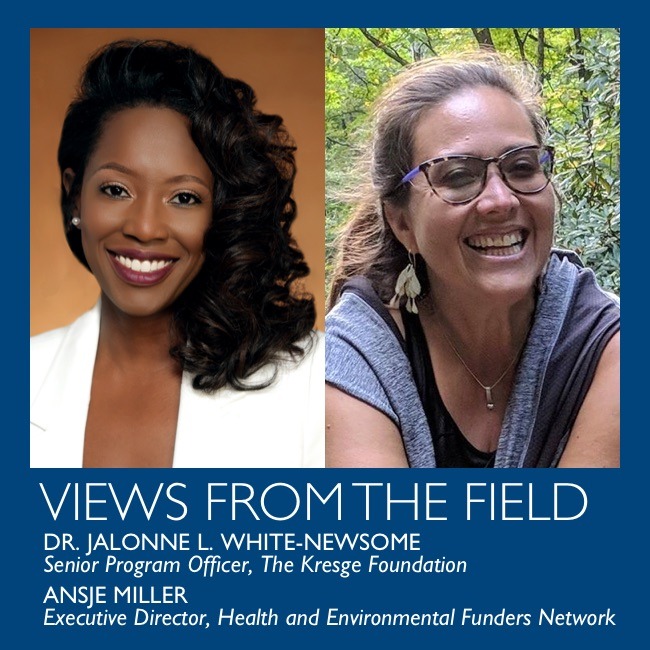At a time when health philanthropy and all it supports are so pandemic-stressed, it may seem counterintuitive to focus on racial justice and climate action. But we and many colleagues believe that, in order to strengthen responses to the pressing crises we face, we must consider some converging determinants of health—racism, climate change, and COVID-19—together. Doing so is essential, not just for crisis management, but also for building resilient systems and infrastructure that enable everyone, particularly Black, Indigenous, and people of color communities, to breathe.
We have both witnessed how racism in the placement of polluting facilities and infrastructure has heightened disease and health vulnerabilities like respiratory ailments and obesity. Combined with structural racism in access to health care and health care systems, this explains the higher rates of COVID-19 cases and related negative health outcomes in Black and Brown communities. Many families in our home states of North Carolina and Michigan continue to be forced out, suffering loss of life and property, due to more frequent storms and hurricanes. As evacuation orders are given, the pandemic forces tough choices about the safety of transportation and emergency shelter. The connections between environmental threats, the pandemic, socio-economic hardship, and racism are painfully visible and particularly devastating for low-income communities and communities of color.
These interactive threats are also showing up as:
- Air Pollution: A Harvard study of 3,080 U.S. counties found that communities breathing dirtier air are also experiencing higher COVID-19 death rates (Friedman and Schlanger 2020). Decades of discrimination have concentrated people of color near sources of air pollution and greenhouse gases. According to a study in the Proceedings of the National Academies of Science, non-Hispanic whites, on average, live with less air pollution than is caused by the goods and services they consume, , whereas Blacks and Hispanics live with a “pollution burden” well in excess of their consumption (Tessum et al. 2019).
- Heat Waves and Droughts: Pre-COVID, communities of color were already being harder hit by dangerous heat waves and droughts. Economic hardship and coronavirus exposure concerns are now further complicating climate adaptation options for relief, like air-conditioned housing and cooling centers (Sengupta 2020).
- Water Systems: America’s water systems are in disrepair and being battered by climate-driven storms and flooding. The health of low-income communities and people of color has been hampered for years by water access, quality, and affordability problems; intensified needs for handwashing in the pandemic make water an even more acute health and equity concern.
The interplay of these problems is not all bad news. Seeing them holistically can open up a map of opportunity for grantmaking and collaboration. A survey conducted in 2019 by Grantmakers In Health, the Health and Environmental Funders Network (HEFN), and several other funder groups found a diversity of foundations and nonprofits deployed nearly $800 million in 2019 grantmaking to address climate change, health, and equity concerns. As you explore your community’s challenges and investment opportunities, consider these highlights from the survey about ways respondents have centered their investments:
- Varied angles of engagement: Foundations are approaching some combination of health, racial equity, and climate issues from the neighborhood to global levels, in urban and rural settings. Some of this work is explicitly framed around climate change, while other angles include environmental justice, food systems, transportation, health, and housing.
- Shared focus on those most impacted: Most foundation and nonprofit survey respondents reported an equity-grounded focus on groups being heavily impacted, like low-income communities, communities of color, children, and young people.
- Power-building: Top tactics being used by both funders and nonprofits include advocacy, capacity-building, public policy, and coalition-building. Respondent comments reflected an understanding that strengthening the voices of those most impacted can improve the health of their lives, our communities, and our democracy.
Community stresses during the pandemic and recession intensify the need to make every grant dollar count. A positive opportunity in racial justice and climate action work is the potential for multisolving, or making improvements on multiple fronts at once. The Robert Wood Johnson Foundation, for example, is inviting planning grant proposals for equitable parks and urban green space initiatives, citing the valuable roles parks can play in offering safe outlets from pandemic confinement, recreation, physical and mental health benefits, and mitigation of storm water runoff and heat island threats. Making urban green spaces more accessible and responsive to communities of color offers multiple gains. The Kresge Foundation’s Climate Change, Health & Equity initiative, launched in early 2019 as a partnership between the foundation’s Environment and Health Programs, seeks to mobilize a strong constituency for equitable climate action within health care institutions, among health practitioners and community-based advocates in a way that is responsive to the needs and priorities of low-income, urban communities.
Achieving these goals requires a rethinking of not just what foundations invest in, but who and how. Among those stepping up racial justice grantmaking are funders supporting organizations or pooled funds for climate and environmental justice work led by Black people, Indigenous Peoples, and other people of color. HEFN is partnering with one such organization, the Building Equity and Alignment for Impact Fund, to help a group of funders explore more participatory grantmaking processes for supporting community-based work including on climate justice.
In these stressed times, there are spots of light as people connect their work on health, racial justice, and climate action. The potential for building equitable resilience holds promise of more space to breathe, for everyone.
Dr. Jalonne L. White-Newsome, Senior Program Officer, The Kresge Foundation, is co-chair of the HEFN Steering Committee.
Ansje Miller is the Executive Director of HEFN.
This blog post originally appeared on GIH’s Views from the Field on Sept. 14, 2020. HEFN’S 2020 Annual Convening, “It’s The Air We Breathe: Philanthropy’s Role In Dismantling Systems Of Injustice…With A Two-Year Focus On The South” opens on Oct. 19, 2020. Learn more.

